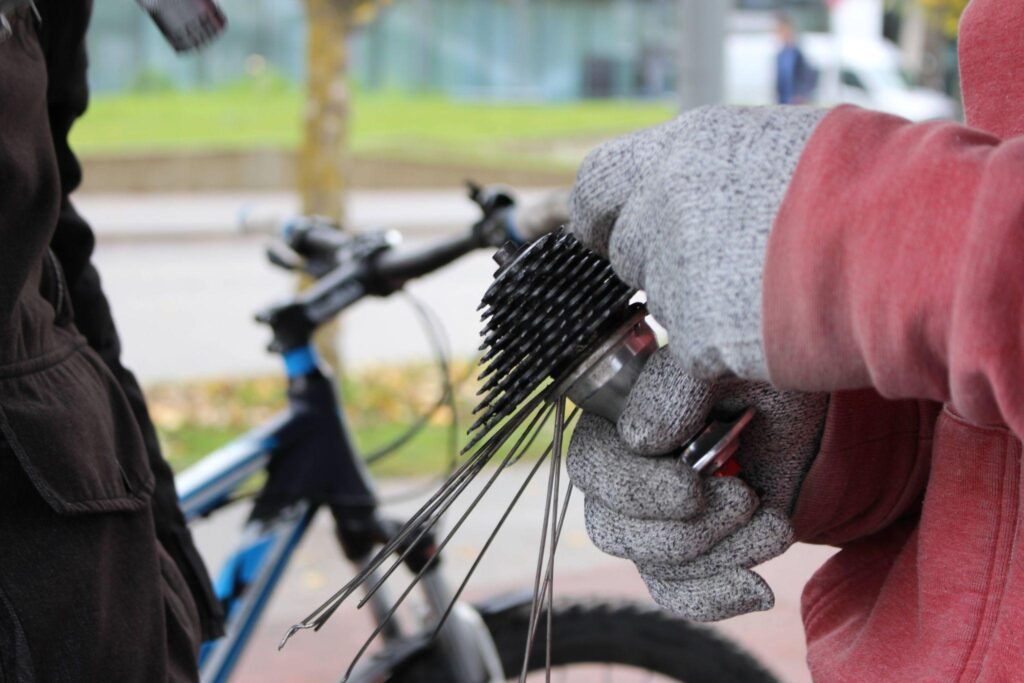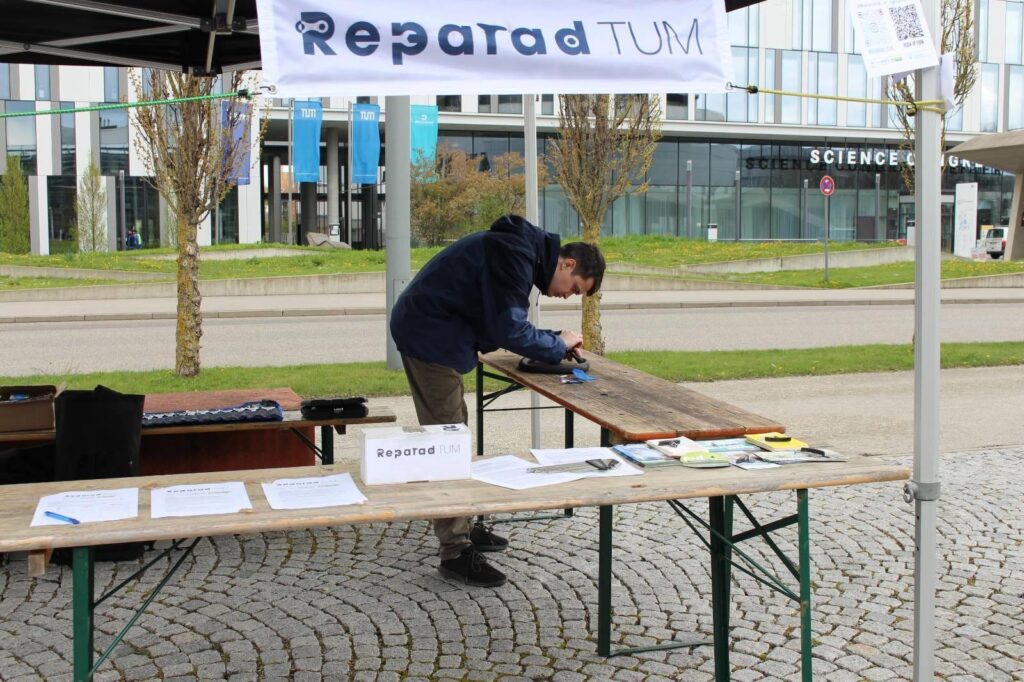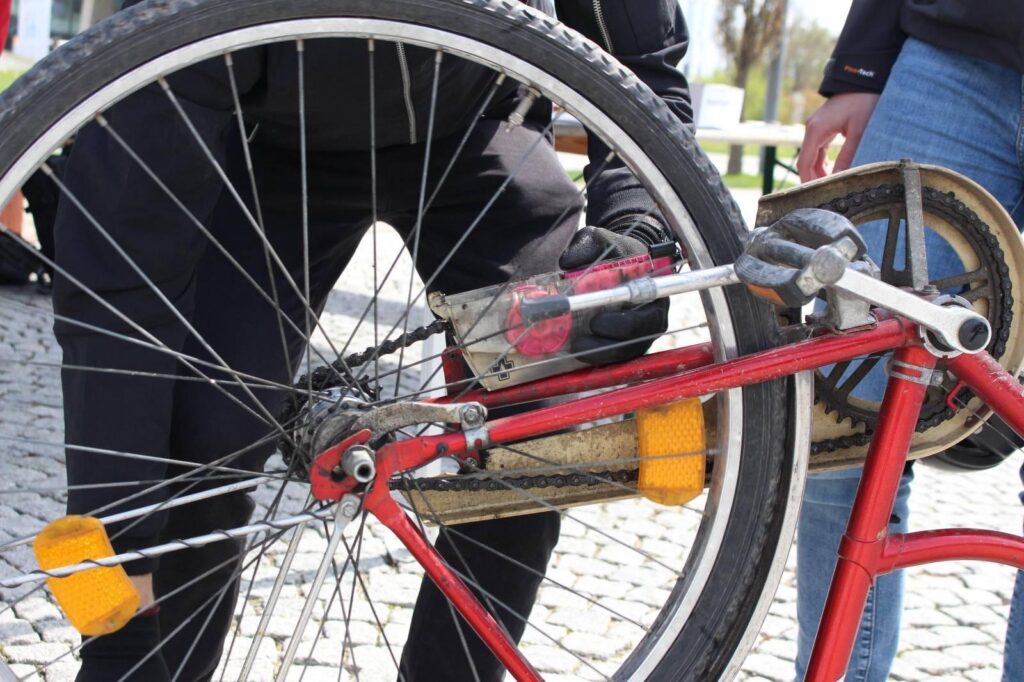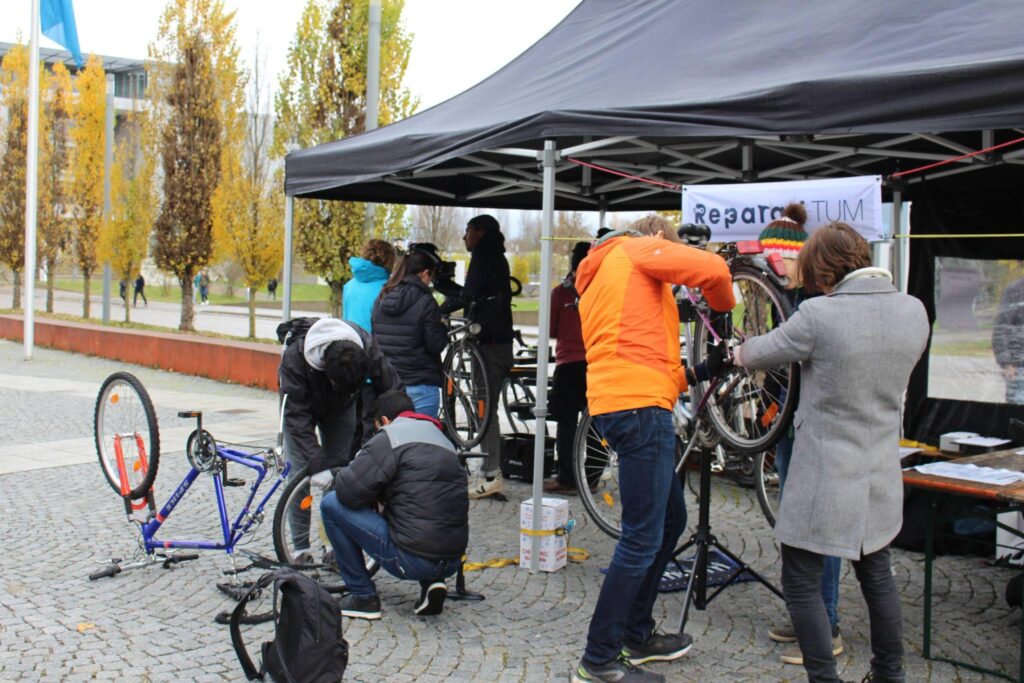ReparadTUM, a Student Bike Kitchen initiative in Munich
By Santiago Londoño Castillo

ReparadTUM volunteer taking a look at the cogset of a bike during one of the pop-up workshops held in Garching, Munich. Image by Santiago Londoño Castillo
Location:
Munich, Germany
Who are the promoters?
An internal survey conducted in 2022 indicated that over half the students at Munich’s universities cycle regularly. However, many respondents pointed out that they often lacked the tools or skills to fix their bikes in case of breakdown. Based on this information, a group of students from the technical university of Munich (TUM) and recently also from the Ludwig-Maximilian University (LMU) with the support of their respective student unions and their environment department (Referat für Umwelt), and VCD (Verkehrsclub Deutschland e.V), decided to create reparadTUM: a space for bike self-repairs, where tools are available and volunteers ready to give students a hand fixing their bikes a.k.a a bike kitchen.
Who are the beneficiaries?
The internal survey identified the TUM students at the Garching campus (on the outskirts of Munich) as the main beneficiaries of the initiative, approximately 40.000 students. The initial plan of reparadTUM was to establish a permanent bike kitchen on campus, with fixed opening days/hours. However, due to the lack of space on campus and limited funding, reparadTUM started by first hosting pop-up workshops. The pop-up workshops take place for one or two days in open spaces on campus and any student can come to fix their bike or get advice. Hitherto, three pop-up workshops have been held in Garching, almost exclusively for TUM students, and on the 31st of May, the first workshop in downtown Munich took place as a result of a collaboration between LMU and TUM students. In the long run, as more volunteers join and the project grows, the goal is to establish permanent bike kitchens in different locations on campus and to expand the number of people who can benefit from it.
What is cooking up in this kitchen?
Vision, Mision and Climate Engagement of ReparadTUM
The reparadTUM project aims to engage with climate in a manifold of ways, from the political to the more practical aspects of biking in a city, it aims to be more than simply a “green initiative”. The points below summarise not only the connections between reparadTUM and environmental issues but also the values it stands for and its objectives as a project to address those issues.
● Green mobility and mobility justice
House to the automobile giant BMW, Munich has become a city with one of the highest motorization rates in Germany, with almost 1⁄3 of all daily trips within Munich being car trips (Buehler et al., 2016). In the past years, this trend has been reversing, and the city has made a considerable effort to increase green mobility, mainly by expanding its public transportation networks, nonetheless, the transport fares remain too high for many to afford, pushing them to bike or walk. ReparaTUM believes that everyone has the right not only to safe bike roads but also to a safe and functioning bike. By providing free bike repairments, reparadTUM aims not only to boost the use of bicycles but also to keep biking from becoming a privilege that not everyone can afford.
Moreover, as a collective, reparadTUM engages with and supports larger organizations advocating for green mobility, mobility transition and bike safety, such as ADFC (German Cyclist’s Association), VCD (German Traffic Club), and Critical Mass. Among some of the key points these organizations are backing are safer and better-connected bicycle lanes, introducing speed limits in the autobahn and 30 km/h as default speed within cities, and more affordable public transportation fares. ReparadTUM has attended public demos, mass rides, and events organized by these organizations since we know that organizations, operating at a national level and working beyond “bicycle matters”, are as important as small collectives to transition to a greener and more just mobility. Thus, we seek to engage and support already established organizations advocating for mobility justice policies.
● Mutual aid and community building
Everyone involved with reparadTUM is a volunteer and none of its members receive any monetary benefits from taking part, it is overall, a solidarity project. Besides voluntary donations, used to purchase tools, no monetary transactions take place during the workshops, we work there because we enjoy doing it and not because we expect something in return. Moreover, reparadTUM wants to be more than an ordinary bike shop, where people go to just get their bike fixed and then leave, it wants to provide a social space where people go to talk, eat, teach what they know and learn what they do not, a space for the exchange of ideas, free of discrimination where everyone feels welcome, in an era of capitalist alienation we need to build stronger and healthier communities.

ReparadTUM volunteer working on a flat tyre during the last pop-up workshop held in March 2023 in Garching, Munich. Image by Santiago Londoño Castillo
● Circular economy and waste reduction
Last but not least, we live in a time where discarding something as soon as it breaks down has become the norm, and this is a problem that goes beyond individuals’consumerist/wasteful attitude, it is a problem of design, skill and costs. When someone’s bike breaks down, many people cannot afford to take it to a bike shop due to their high costs, at the same time, most people do not have the right tools at home to fix their bike, and if they do many simply do not have the skills. The result is that the person stops using their bike, insists on riding a broken and potentially dangerous bike, or, given the high prices for certain bike fixes compared to second-hike bikes, buys a used bike. The outcome is almost universally the same, a bike, far from completing its useful lifespan, going to waste. ReparadTUM wants to address this issue, not only by providing the tools and assistance for citizens to fix their bikes, but also by teaching them the necessary skills to fix a bike, so that next time not only can this person fix their bike if it breaks, but maybe even assist their neighbours or family, saving yet one more bike from going to waste. ReparadTUM is no ordinary bike workshop, you are your own mechanic and we just help you help yourself!
Timeline
The initiative started in the summer of 2022, the first few months consisted mainly of thinking about how to turn this idea into a reality, i.e. finding the funding, spaces, people, existing literature and similar initiatives in the city and Germany. In this initial stage, reparadTUM came a long way, members got in touch with organisations, initiatives and collectives, official and unofficial, regarding funding, ideas, challenges and limitations. Based on the feedback and information acquired during this time a realistic plan was set, initially, reparadTUM would host pop-up workshops on campus a couple of times per semester, which would provide its members with experience about bike kitchens, statistics which can then be used for further funding and planning and as a way to get exposure, i.e. what is reparadTUM and what they do. To this day, June 2023, four pop-up workshops, which nearly 100 people attended in total, have successfully taken place, three in Garching and the latest one, held on May 31st, in downtown Munich. From the positive feedback received during the workshops and as more students get on board, reparadTUM is planning to start hosting regular workshops, every two weeks, on campus after summer 2023. The idea is to have enough volunteers and attendees to be able to soon establish a permanent location on campus where the bike kitchen will regularly take place and be open a couple of times per week. If this first bike kitchen proves successful, reparadTUM would like in the long term to establish workshops in different locations and potentially expand this initiative beyond university students. Despite having been active for only one year, reparadTUM has got a long way, additionally to the successful workshops carried out so far, and the dozens of bikes saved from an early retirement, the project already counts with a bicycle-specific toolkit comparable to that of a small bike shop, and its active members have gone from a handful last year to nearly 40 at the time being, with more joining every week. Moreover, the feedback from the workshops has been almost exclusively positive, being the regularity of pop-up workshops one of the only improvement areas.
Who are the members of reparadTUM?
The majority of members are university students with very diverse backgrounds. None of us are bike experts or mechanics, many of the members did not have a lot of experience fixing bikes when they first joined the project, we are just a group of bike enthusiasts happy to learn from each other as we go. Despite most of the members being German speakers, we have a very diverse group with many international members, all reparadTUM communications and meetings are carried out in English to make it as international-friendly as possible. ReparadTUM has also received valuable support, both economically and logistically from the TUM student union, in particular its department for the environment, which also consists almost entirely of university students.
Limits and challenges
Being a very new, student-led project, reparadTUM has encountered mainly economic, and physical limitations. To begin with, the project needed initial funding to acquire the most essential tools, reparadTUM applied to several stipends, funds and funding opportunities, both public and private. Finally, after a staggering amount of paperwork and bureaucracy, which seems to be common in Germany, reparadTUM secured its initial funding to kickstart the project. However, the funding itself came with its limitations, in particular, since the funding came from the student union, only students could attend the pop-up workshops, something which has impacted severely the outreach of the project. Another limitation has been space, due to the shortage of rooms at the university campus, reparadTUM has been unable to find a permanent location where to set up its operations, currently, the project could not afford to rent a permanent place and all the tools are inconveniently stored at the student union’s basement.

Bike owner cleaning the chain of their bike during one of reparadTUM’s pop-up workshops in Garching. Image by Dais Davy
Criticism
One significant shortcoming of this project has been its target audience and outreach. Despite having the intention to reach out to as many people as possible, reparadTUM has so far remained almost entirely within the student sphere in Munich, mainly two factors account for this; funding and location. First of all, as was discussed before, since most funding comes from the student union, due to legal reasons reparadTUM can only provide tools and spare parts to students. Moreover, the funding received so far has been able to secure only a limited number of tools and spare parts, making it difficult to increase the project’s outreach without increasing the funding accordingly. Secondly, most of the students involved in the project are located on the Garching campus, 20 km away from the city centre, where so far most of the pop-up workshops have taken place. Due to its distance from the city and the presence almost exclusively of the university in this area, the majority of people biking from and to Garching are students. In the long term, hopefully, reparadTUM will manage to increase the number of people that have access to their workshops and bike kitchens, one step in this direction is already being taken; on May 31st reparadTUM held its first pop-up workshop in the city centre, which proved to be a great success, with a record-high attendance.
Replicability
Replicability is one of the greatest advantages of this project. One needs very little to get a bike kitchen started, from our experience at reparadTUM we have noticed that a great number of the bikes that are brought to the workshops can be fixed with very basic tools: patches, screwdrivers, hex keys and oil. Bike kitchens can be easily started at any scale, neighbourhood, school, workplace, university, or city, one only needs a couple of tools and a group of motivated people who are willing to learn and do not mind getting their hands dirty. Naturally, as the scale of the bike kitchen grows so do the challenges it involves and the resources necessary, which means that if you want to give it a shot, call your friends and neighbours, gather some tools and get to work!

Pop-up workshop held by reparadTUM in November 2022 in Garching, Munich Image by Santiago Londoño Castillo
Is reparadTUM conducive to broader changes?
The power of initiatives such as reparadTUM lies in its simplicity, both in terms of replicability and implementation. Just a year ago, reparadTUM started with a couple of students and bike enthusiasts with some basic tools and very little bike-repairing experience, today, the project counts nearly 40 members, a well-equipped tool-box and many plans to keep growing and doing what we love.
Bike kitchens and projects like reparadTUM want to provide new ways to look not only at bike repair but at community initiatives as a whole. As a living example of mutual aid and community economies, bike kitchens show us that other ways of providing services and interacting with each other, outside the capitalist sphere, are possible, work and are already here. Bike kitchens modify our reality, a broken bike goes from being a potentially very expensive nightmare, into an opportunity to learn a new skill, hang out with your friends and all without having to spend money. Then, the natural question becomes “If this is possible for bikes why not for everything else?”. Big disruptions begin with small changes led by strong communities, which then lead to new policies first at the local and ultimately at the national and global scale. ReparadTUM is just one out of hundreds of community initiatives springing all around the world, ultimately, all these initiatives strive to build a better and more just world, one community at a time.
References
Buehler, R., Pucher, J., Gerike, R., & Götschi, T. (2017). Reducing car dependence in the heart of Europe: lessons from Germany, Austria, and Switzerland. Transport Reviews, 37(1), 4–28. doi:10.1080/01441647.2016.1177799